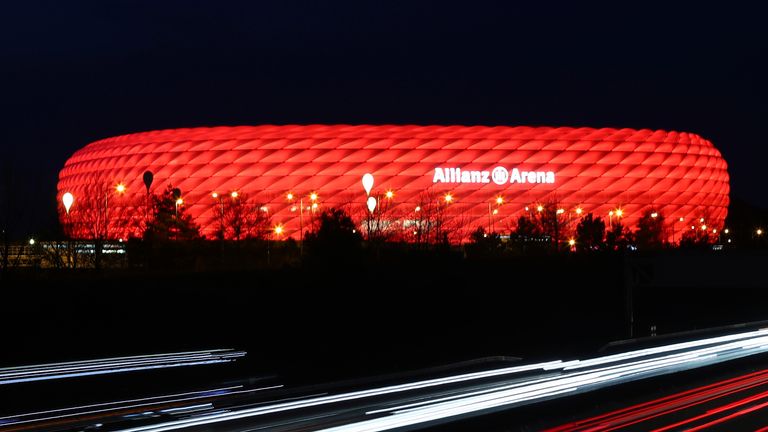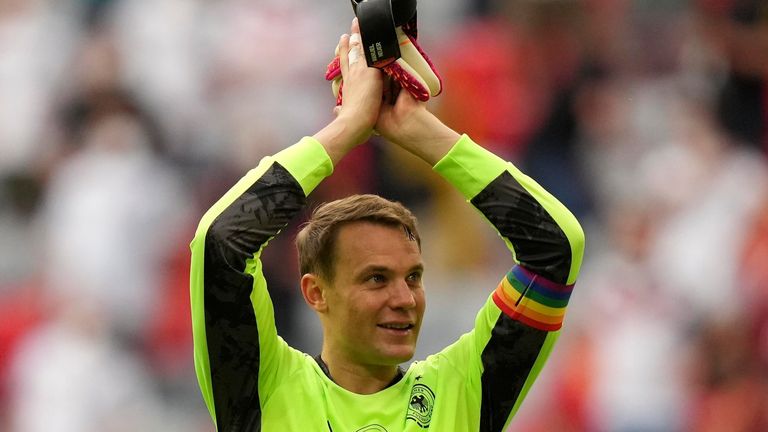Germany vs Hungary: UEFA refuses Munich Stadium rainbow illumination for Euro 2020 Group F match
UEFA has turned down a request from the mayor of Munich for the city’s stadium to be lit up in rainbow colours for the Euro 2020 Group F match between Germany and Hungary.
European football’s governing body said it received the request from the mayor of the German city, Dieter Reiter, on Monday.
Reiter had said he wanted to light up the stadium in the colours in protest against a new law in Hungary that bans the dissemination of content in schools deemed to promote homosexuality and gender change.
On that basis, UEFA said it could not grant the request and proposed alternative dates for the stadium to be lit up in rainbow colours.
- UEFA investigating Hungary homophobia, racism claims
- Review dropped into Manuel Neuer’s rainbow armband
- UEFA: No plans to move Euro 2020 final from Wembley
- Euro 2020: Hosts, dates, teams, fixtures, format
A statement from European football’s governing body read: “UEFA has yesterday received a request from the mayor of Munich, Dieter Reiter, on behalf of the city council, to have the arena in Munich illuminated in rainbow colours at the upcoming UEFA EURO 2020 group stage match between Germany and Hungary.
Trending
“In this letter, the mayor outlines the reasoning behind this request to be a political decision which has been taken by the Hungarian parliament.
“UEFA understands that the intention is also to send a message to promote diversity and inclusion – a cause, which UEFA has been supporting for many years having joined forces with European clubs, national teams and their players, launching campaigns and plenty of activities all over Europe to promote the ethos that football should be open to everyone and consequently UEFA has proposed alternative dates for the illumination which align better with existing events.
“UEFA is determined to play its part in positive change and believes that discrimination can only be fought in close collaboration with others.
“As European football’s governing body, UEFA recognises it has an obligation to unite and coordinate the efforts of fans and institutions across Europe – because it is everybody’s responsibility to rid discrimination from the game.
“Very recently, in the build up towards the UEFA EURO 2020 tournament, UEFA has kicked off a new campaign called ‘Sign for an Equal Game’ encouraging fans, players, clubs, national associations and other football stakeholders to join the fight against discrimination. Sign for an Equal Game forms the latest instalment of the Equal Game campaign, which has run for the past four seasons and which aims to create positive social impact under UEFA’s overarching value of Respect. Its main purpose is to make people aware that football is for everyone, no matter who they are, where they are from and how they play.
“Racism, homophobia, sexism, and all forms of discrimination are a stain on our societies – and represent one of the biggest problems faced by the game today. Discriminatory behaviour has marred both matches themselves and, outside the stadiums, the online discourse around the sport we love.
“However UEFA, through its statutes, is a politically and religiously neutral organisation. Given the political context of this specific request – a message aiming at a decision taken by the Hungarian national parliament – UEFA must decline this request.
“UEFA has nevertheless proposed to the city of Munich to illuminate the stadium with the rainbow colours on either 28 June – the Christopher Street Liberation Day – or between 3 and 9 July which is the Christopher Street Day week in Munich.”
Christopher Street Day events are held in memory of an uprising by homosexuals in New York in 1969.
The stadium, known as the Allianz Arena, home to Bayern Munich, is configured to allow the entire external area and roofing to be lit up in various colours.
The decision comes after UEFA also dropped an investigation into Manuel Neuer’s wearing of a rainbow-coloured armband in Germany’s Euro 2020 matches against France and Portugal.
The Bayern ‘keeper had been wearing the armband, which is a symbol of solidarity with the LGBT+ community, during Pride Month in June.
UEFA was understood to be looking into whether the armband had breached its rules regarding on-field political statements, but on Sunday the DFB confirmed the investigation had been stopped.
Meanwhile, European football’s governing body are also investigating potential discriminatory incidents that occurred during Hungary’s first two matches of the tournament at the Puskas Arena in Budapest.
Source: Read Full Article


